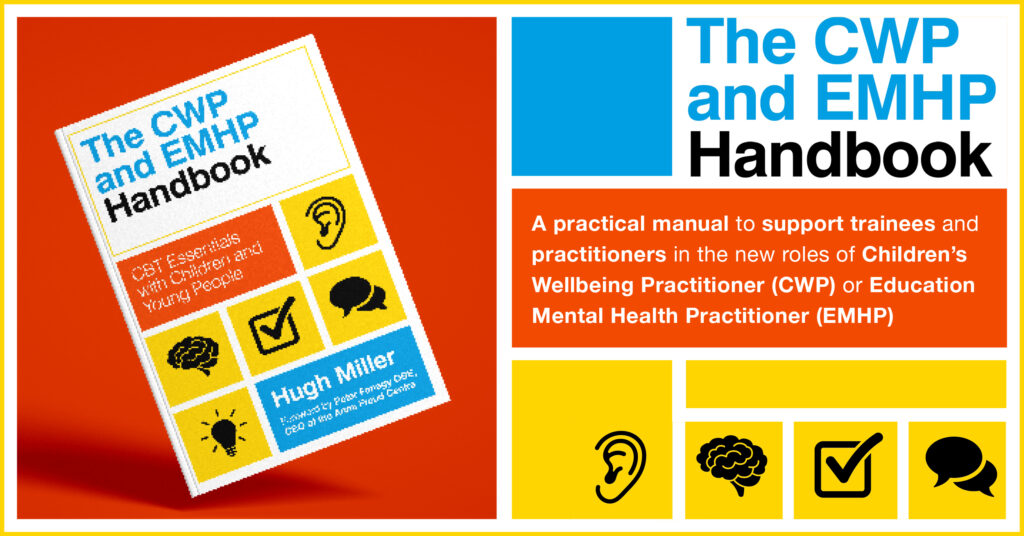
The below is an extract in a chapter from The CWP and EMHP Handbook called ‘Looking After Yourself’ which gives an insight from practitioners on how they keep their wellbeing in check, and cope with the demands of the job.
By the end of the training year most practitioners feel totally frazzled. One group of EMHPs questioned if they’d have applied if they’d known how tough it would be. Here are some of the group’s tips on surviving the year.
I’ve had to learn to let things go. I’ve spent hours ruminating about
sessions and how they’ve gone, questioning myself and saying, ‘I
should I have done this or that.’ I now have a list of positive self-talk
statements and if I notice myself going down that rabbit hole I practise
using them – stuff like ‘I’ve done my best, keep going, tomorrow will
be even better than today.’ They help.
I’ve had to be really strict with myself and never work at weekends!
It’s been really hard to bracket them off but having two full days off
helps me reset and recharge.
At a particularly low point during the course, with loads of deadlines
hanging over me, I did a ‘chairwork’ exercise with my supervisor where
she asked me to imagine the younger me, the one applying for the
course, sitting on a chair opposite me. She asked me to describe the
values that drove the younger me to apply to be an EMHP. Th is helped
me connect back to what drove me to do this role and why I’m here in
the fi rst place. It was also a reminder that I am a kind person, and that
I need to give myself a bit more of that kindness when I get frustrated
with myself. I wrote down some practical tips that the ‘younger me’
would encourage me to follow in times of stress, and they help.
I’ve learnt to look at who’s responsible for progress and a good outcome,
and question if it’s all my responsibility. It’s all so systemic.
Sometimes I do a responsibility pie, looking at who is involved in the
person’s progress. I might only be 25 per cent of that. It has to come
from the family too. They have to be engaged. I also do a visualisation
when my day is done. I visualise a big switch for my working day and
turn it off. I then imagine putting my laptop away in a box and say
‘bye-bye work!’ When working from home I’ve realised I probably talk
too much about work stress with my family, which isn’t good. It’s
much healthier to have a ten-minute chat with a colleague at the end
of each day to off-load.
I always want my young people to make big improvements and it
stresses me out when it doesn’t happen. My supervisor told me something
really helpful. She said our job purpose is to follow the protocols
as best we can, rather than ensuring improvement. This really helped,
because obviously lots of other stuff happens in kids’ lives – family
stuff, friendships and even pandemics. We’re all nice and of course we
want to help. But we need to unhook ourselves from the expectation
we can make everyone better. We just need to follow the manuals and
the approaches as best we can, tailored to each young person.
I hate saying no to people…and I hated even bringing this difficulty
up…but I just had to talk to my supervisor about it as I wasn’t coping
with the essays, case studies and clinical work all at once. She helped
me work out my priorities, and we agreed the number one priority
was for me to pass the course. If I didn’t manage that, nothing else
would matter anyway! It was awkward talking about it as I don’t like
others to think I can’t cope, but it was really useful.
During sessions I often start doubting how things are going… I think
‘they’re bored…this isn’t going well…’ and so on. I’ve learnt to look
for the evidence and check in more often with my client. For example,
I’ll ask, ‘are you happy to carry on?’ I know I’ve got a negative
mental filter, and this helps me rebalance that. I have to work at not
over-thinking, just accepting the young person’s answers rather than
mind-reading them and doubting they’re telling the truth…and that
helps the sessions flow a lot better for me.
If you enjoyed this piece on EMHP and CWP wellbeing and want to be updated on more blog content, book releases and other news, please sign up to our mailing list here.